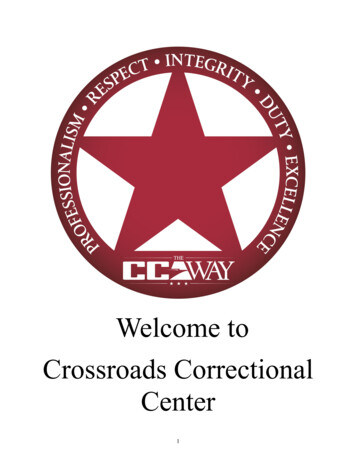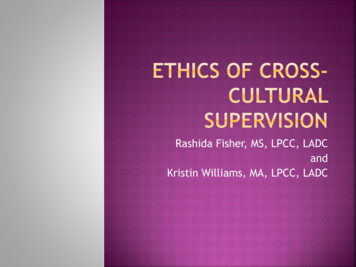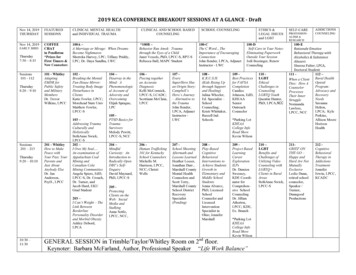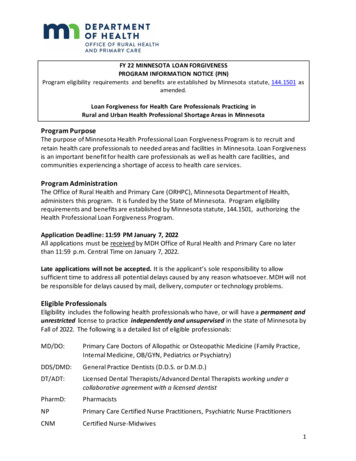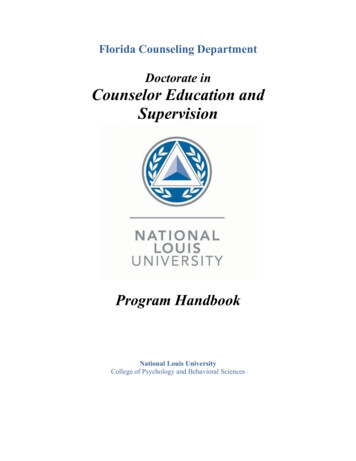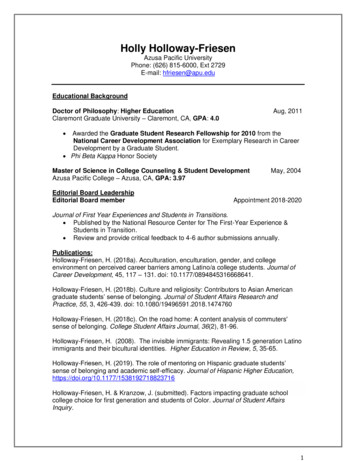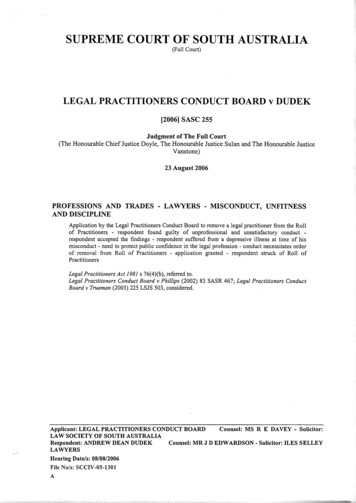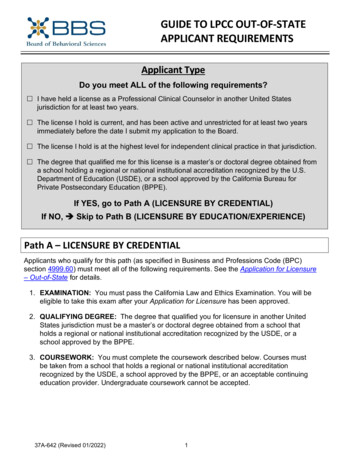
Transcription
GUIDE TO LPCC OUT-OF-STATEAPPLICANT REQUIREMENTSApplicant TypeDo you meet ALL of the following requirements? I have held a license as a Professional Clinical Counselor in another United Statesjurisdiction for at least two years. The license I hold is current, and has been active and unrestricted for at least two yearsimmediately before the date I submit my application to the Board. The license I hold is at the highest level for independent clinical practice in that jurisdiction. The degree that qualified me for this license is a master’s or doctoral degree obtained froma school holding a regional or national institutional accreditation recognized by the U.S.Department of Education (USDE), or a school approved by the California Bureau forPrivate Postsecondary Education (BPPE).If YES, go to Path A (LICENSURE BY CREDENTIAL)If NO, Skip to Path B (LICENSURE BY EDUCATION/EXPERIENCE)Path A – LICENSURE BY CREDENTIALApplicants who qualify for this path (as specified in Business and Professions Code (BPC)section 4999.60) must meet all of the following requirements. See the Application for Licensure– Out-of-State for details.1. EXAMINATION: You must pass the California Law and Ethics Examination. You will beeligible to take this exam after your Application for Licensure has been approved.2. QUALIFYING DEGREE: The degree that qualified you for licensure in another UnitedStates jurisdiction must be a master’s or doctoral degree obtained from a school thatholds a regional or national institutional accreditation recognized by the USDE, or aschool approved by the BPPE.3. COURSEWORK: You must complete the coursework described below. Courses mustbe taken from a school that holds a regional or national institutional accreditationrecognized by the USDE, a school approved by the BPPE, or an acceptable continuingeducation provider. Undergraduate coursework cannot be accepted.37A-642 (Revised 01/2022)1
Path A – LICENSURE BY CREDENTIAL (continued)REQUIRED CALIFORNIA-SPECIFIC COURSEWORK1 semester unit 15 hours; 1 quarter unit 10 hours; 1 semester unit 1.5 quarter unitsCourseLengthCalifornia Law and Ethics12 hoursCalifornia Cultures andthe Social andPsychologicalImplications ofSocioeconomic Position15 hours or1 semesterunitChild Abuse Assessmentand Reporting inCalifornia7 hours(In addition to the courseprovider types listed above,this may be a coursesponsored or offered by aprofessional association ora local, county or statedepartment of health ormental health)Suicide Risk Assessmentand Intervention(Does not need to beCalifornia-specific)37A-642 (Revised 01/2022)6 hours ofcourseworkor appliedexperienceContent RequiredSee BPC section 4999.60(a)(4)(A) for details.Instruction must include an understanding of variousCalifornia cultures and the social and psychologicalimplications of socioeconomic position. See BPCsection 4999.60Instruction must include detailed knowledge of theCalifornia Child Abuse Neglect and Reporting Act(CANRA). It must also include assessment andmethods of reporting of sexual assault, neglect,severe neglect, general neglect, willful cruelty orunjustifiable punishment, corporal punishment orinjury, and abuse in out-of-home care. The trainingshall also include physical and behavioral indicators ofabuse, crisis counseling techniques, communityresources, rights and responsibilities of reporting,consequences of failure to report, caring for a child’sneeds after a report is made, sensitivity to previouslyabused children and adults, and implications andmethods of treatment for children and adults. SeeBPC sections 28 and 4999.60 and Title 16, CaliforniaCode of Regulations section 1807 See BPC section 4999.66 for details.2
Path B – LICENSURE BY EDUCATION/EXPERIENCEApplicants who do not qualify for Path A “Licensure by Credential” must meet the followingrequirements, specified in Business and Professions Code (BPC) sections 4999.61 &4999.62. See the instructions in the Application for Licensure – Out-of-State for details.1. EXAMINATIONS: You must pass both of the following exams: California Law and Ethics Exam: You will be eligible to take this exam afterissuance of your Associate number or approval of your Application for Licensure. National Clinical Mental Health Counselor (NCMHCE) Exam: If you have alreadypassed this exam, the Board may be able to accept your passing score as follows:o If you do not currently hold a license in another state or country, your passingscore must be less than seven (7) years old;o If you currently hold a license or registration in another state or country and thelicense or registration is active and in good standing at the time of application andis not revoked, suspended, surrendered, denied or otherwise restricted orencumbered, a passing score of any age will be accepted;o The Board receives official verification of your passing score from the NationalBoard for Certified Counselors (NBCC). Please follow the instructions in theApplication for Licensure.If you have not yet passed the NCMHCE, you will be eligible to take it after approvalof your Application for Licensure and after passing the Law and Ethics Exam.2. SUPERVISED EXPERIENCE: Your experience must be substantially equivalent toCalifornia’s requirements as described below. If you are licensed as an LPCC in another state or country at the highest levelfor independent clinical practice: Your requirements will depend on whether youwere licensed at the highest level for independent clinical practice in a jurisdiction ofthe United States vs. another country. It will also depend on how many hours wererequired for that license by the other state or country, as described below:o If you are licensed in another United States jurisdiction that requires at least3,000 hours of experience: You do not need to submit verification of experience.o If you are licensed in another country: You must submit verification of 3,000hours of substantially equivalent experience that includes 104 supervised weeks.o If you are licensed in another state or country that requires less than 3,000 hoursof experience: You may make up the deficit using time actively licensed in goodstanding in another state or country at the rate of 100 hours per month licensed atthe highest level (up to a maximum of 1,200 hours). You do not need to submitverification of these hours.If additional hours are needed and will be gained in California, you must first registeras an Associate and comply with all requirements for hours gained in California.37A-642 (Revised 01/2022)3
Path B – LICENSURE BY EDUCATION/EXPERIENCE (continued) All other applicants:You must submit verification of substantially equivalent supervised experiencetotaling 3,000 hours as described below:o Experience must have been supervised by a licensed mental health professional.o Experience must have been gained within the six (6) years prior to the Board’sreceipt of your California application.o If you are not licensed in another state or country at the highest level forindependent clinical practice, you must have 104 weeks of supervision.o If any experience will be obtained in California, you must first register as anAssociate and comply with all requirements for hours gained in California.For questions about supervised experience requirements, contact: APCC LPCC.OOS@dca.ca.gov3. QUALIFYING DEGREE: Your degree must be a master’s or doctoral degree obtainedfrom a school that holds a regional or national institutional accreditation recognized bythe USDE, or a school approved by the BPPE. If your degree was obtained outside ofthe United States, you must obtain a degree evaluation in accordance with BPC section4999.40(c). See Summary of LPCC Out-of-State Education Requirements on the nextpage for other minimum degree requirements.4. DEGREE REMEDIATION: You must remediate any deficiencies in your degreeprogram where allowed as specified in BPC section 4999.62. This may include overallunits, core content areas (CCAs), and/or advanced coursework. Certain courseworkmay be made up while you are registered as an Associate. See the chart on the nextpage for a summary, the list of CCAs beginning on page 6, and the instructions in theApplication for Licensure for full details.5. ADDITIONAL COURSEWORK: You must complete coursework in accordance withBPC section 4999.62, some of which must be California-specific. See the chartbeginning on page 7 for details. Courses may be taken from a school with a regional ornational institutional accreditation recognized by the USDE, a school approved by theBPPE, or an acceptable continuing education provider. Undergraduate courseworkcannot be accepted. If it will take you a significant amount of time to complete yourcoursework, you may want to consider registering as an Associate while you are takingthe courses as it will allow you to work as a clinical counselor in California undersupervision.If you are unsure whether your degree or other coursework qualifies (or is deficient), submityour Associate Professional Clinical Counselor Registration Application or Application forLicensure and fee, and we will provide you with the results of the evaluation.For questions about educational requirements, contact: APCC LPCC.OOS@dca.ca.gov37A-642 (Revised 01/2022)4
Summary - LPCC Out-of-State Education Requirements & RemediationPath B - LICENSURE BY EDUCATION/EXPERIENCEDegree program beganprior to 8/1/20121. OVERALLDEGREEUNITSDegree program beganafter 8/1/2012 Minimum 7 of 13 CCAsmust be within degree orwill not qualify for license2A.CaliforniaLaw &EthicsCourse Assessment & DiagnosisCCAs must be withindegree or will not qualify If unlicensed: Mustremediate prior toAssociate registration*Must hold a validlicense as specifiedin BPC section4999.62(b)(1)(D)(iv)3. PRACTICUM 6 semester or 9quarter units and 280 hours ofsupervised face-toface counselingexperience(see BPCsection4999.62)for coursecontentrequirements) Must complete 60 semester units or 90 quarterunits totalCompleted a3 semester unit or4 quarter unit L&Ecourse but noCalifornia contentNo L&E course orcourse is short unitsHolds a valid license in goodstanding in another state orcountry as an LPCC at thehighest level for independentclinical practiceAll Others4. ADVANCED COURSEWORK12-hour California L&Ecourse prior toissuance of Associateregistration required3 semester unit or4 quarter unitCalifornia L&E courseprior to issuance ofAssociate registrationPracticum requirement waivedDegree program must meetpracticum unit/hour requirementsor cannot qualify5. ADDITIONAL COURSEWORK 15 semester units or 22.5 quarter units todevelop knowledge of specific treatmentissues or special populationsMust remediate prior to approval ofApplication for Licensure. Requiredcourses listed on following pages. Must remediate prior to approval ofLicensing application37A-642 (Revised 01/2022) Minimum 48 semester or 72 quarter unitswithin degree or cannot qualify Must remediate prior to approval of Licensingapplication2. CORE CONTENTAREAS (CCAs - see next page) If licensed*: Mustremediate prior toapproval of LicensingapplicationMinimum 48 semester units or 72 quarter unitswithin degree or cannot qualify5
2. CORE CONTENT AREAS - LPCC OUT-OF-STATE DEGREESPath B – LICENSURE BY EDUCATION/EXPERIENCE3 semester units or 4 quarter units of graduate level coursework is required in each of the followingareas. At least 7 of these content areas must be fully within your qualifying degree.All 13 areas are required prior to licensure. See BPC section 4999.62CORE CONTENT AREA:1. Counseling &psychotherapeutictheories &techniques2. Human growth anddevelopmentacross the lifespanREQUIRED CONTENT:The counseling process in a multicultural society, an orientation to wellness andprevention, counseling theories to assist in selection of appropriate counselinginterventions, models of counseling consistent with current professional research andpractice, development of a personal model of counseling, and multidisciplinaryresponses to crises, emergencies, and disasters.Normal and abnormal behavior and an understanding of developmental crises,disability, psychopathology, and situational and environmental factors that affect bothnormal and abnormal behavior.3. Careerdevelopmenttheories &techniquesCareer development decision-making models and interrelationships among andbetween work, family, and other life roles and factors, including the role ofmulticultural issues in career development.4. Group counselingtheories &techniquesPrinciples of group dynamics, group process components, developmental stagetheories, therapeutic factors of group work, group leadership styles and approaches,pertinent research and literature, group counseling methods, and evaluation ofeffectiveness.Basic concepts of standardized and nonstandardized testing and other assessmenttechniques, norm-referenced and criterion-referenced assessment, statisticalconcepts, social and cultural factors related to assessment and evaluation ofindividuals and groups, and ethical strategies for selecting, administering, andinterpreting assessment instruments and techniques in counseling. DEGREECANNOT BE DEFICIENT IN THIS AREA; REMEDIATION NOT PERMITTEDCounselors' roles in developing cultural self-awareness, identity development,promoting cultural counseling theories social justice, individual and communitystrategies for working with and advocating for diverse and techniques populations,and counselors' roles in eliminating biases and prejudices, and processes ofintentional and unintentional oppression and discrimination.Differential diagnosis, and the use of current diagnostic tools, such as the currentedition of the Diagnostic and Statistical Manual, the impact of co-occurring substanceuse disorders or medical psychological disorders, established diagnostic criteria formental or emotional disorders, and the treatment modalities and placement criteriawithin the continuum of care. DEGREE CANNOT BE DEFICIENT IN THIS AREA;REMEDIATION NOT PERMITTEDStudies that provide an understanding of research methods, statistical analysis, theuse of evaluation research to inform evidence-based practice, the importance ofresearch in advancing the profession of counseling, and statistical methods used inconducting research, needs assessment, and program evaluation.Professional ethical standards and legal considerations, licensing law and process,regulatory laws that delineate the profession's scope of practice, counselor-clientprivilege, confidentiality, the client dangerous to self or others, treatment of minorswith or without parental consent, relationship between practitioner's sense of self andhuman values, functions and relationships with other human service providers,strategies for collaboration, and advocacy processes needed to address institutionaland social barriers that impeded access, equity, and success for clients.5. Assessment,appraisal, & testingof individuals6. Multiculturalcounseling theories& techniques7. Principles of thediagnostic process8. Research andevaluation9. Professionalorientation, ethics& law in counseling37A-642 (Revised 01/2022)6
2. CORE CONTENT AREAS - LPCC OUT-OF-STATE DEGREES (continued)Path B – LICENSURE BY EDUCATION/EXPERIENCECORE CONTENT AREA:REQUIRED CONTENT:10. Psychopharmacology The biological bases of behavior, basic classifications, indications, andcontraindications of commonly prescribed psychopharmacological medications sothat appropriate referrals can be made for medication evaluations and so that sideeffects of those medications can be identified.11. AddictionsSubstance abuse, co-occurring disorders, and addiction, major approaches tocounselingidentification, evaluation, treatment, and prevention of substance abuse andaddiction, legal and medical aspects of substance abuse, populations at risk, therole of support persons, support systems, and community resources.12. Crisis or traumaCrisis theory; multidisciplinary responses to crises, emergencies, or disasters;counselingcognitive, affective, behavioral, and neurological effects associated with trauma;brief, intermediate, and long-term approaches; and assessment strategies for clientsin crisis and principles of intervention for individuals with mental or emotionaldisorders during times of crisis, emergency, or disaster.13. Advanced counseling The application of counseling constructs, assessment and treatment planning,& psychotherapeutic clinical interventions, therapeutic relationships, psychopathology, or other clinicaltheories andtopics.techniques5. ADDITIONAL COURSEWORKLPCC OUT-OF-STATE APPLICANTSPath B – LICENSURE BY EDUCATION/EXPERIENCENote: 1 semester unit 15 hours; 1 quarter unit 10 hours1 semester unit 1.5 quarter unitsCoursea) Suicide Risk Assessment andInterventionLength6 hours ofcourseworkor appliedexperienceContent RequiredSee BPC section 4999.66b) Human Sexuality10 hoursInstruction must include the study of the physiological,psychological, and social cultural variables associatedwith sexual behavior, gender identity, and theassessment and treatment of psychosexualdysfunction. See BPC sections 25 and 4999.62 andTitle 16, California Code of Regulations section 1807c) Spousal/Partner AbuseAssessment, Detection andIntervention15 hoursInstruction must cover spousal and partner abuseassessment, detection, intervention strategies, andsame-gender abuse dynamics. See BPC section4999.6237A-642 (Revised 01/2022)7
5. ADDITIONAL COURSEWORKLPCC OUT-OF-STATE APPLICANTS (continued)Path B – LICENSURE BY EDUCATION/EXPERIENCECourseLengthContent Requiredd) Child Abuse Assessment andReporting in California7 hoursInstruction must include detailed knowledge of theCalifornia Child Abuse Neglect and Reporting Act(CANRA). It must also include assessment andmethods of reporting of sexual assault, neglect, severeneglect, general neglect, willful cruelty or unjustifiablepunishment, corporal punishment or injury, and abusein out-of-home care. The training shall also includephysical and behavioral indicators of abuse, crisiscounseling techniques, community resources, rightsand responsibilities of reporting, consequences offailure to report, caring for a child’s needs after a reportis made, sensitivity to previously abused children andadults, and implications and methods of treatment forchildren and adults. See BPC sections 28 and 4999.62and Title 16, California Code of Regulations section1807.2e) Aging, Long Term Care andElder/Dependent Adult Abuse10 hoursInstruction must cover aging and long-term care,including biological, social, cognitive and psychologicalaspects of aging, and instruction on the assessmentand reporting of, as well as treatment related to, elderand dependent adult abuse and neglect. See BPCsection 4999.62f) Mental Health Recovery OrientedCare and Methods of ServiceDelivery45 hours or3 semesterunitsInstruction must cover principles of mental healthrecovery-oriented care and methods of service deliveryin recovery-oriented practice environments, includingstructured meetings with various consumers and familymembers of consumers of mental health services toenhance understanding of their experience of mentalillness, treatment and recovery. See BPC section4999.62g) California Cultures and the Socialand Psychological Implications ofSocioeconomic Position15 hours or1 semesterunitInstruction must include an understanding of variousCalifornia cultures and the social and psychologicalimplications of socioeconomic position. See BPCsection 4999.6237A-642 (Revised 01/2022)8
The counseling process in a multicultural society, an orientation to wellness and prevention, counseling theories to assist in selection of appropriate counseling interventions, models of counseling cons istent with current professional research and practice, development of a personal model of counseling, and multidisciplinary
